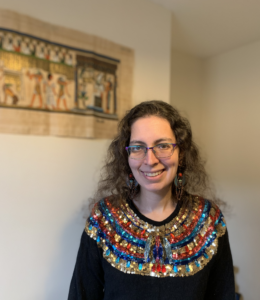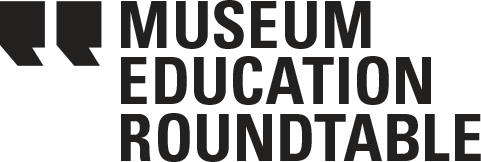Eight years ago, I was in museum studies and education classes taught by William B. Crow, Marissa Petrou, Glenn Wharton, Ruth Cohen, and Hima Gleason. We were assigned the Journal of Museum Education, and examined the legal aspects of 5013(c) nonprofits. At that time, I never imagined that I would one day be part of, or indeed, even leading, the Museum Education Roundtable. It was also then that my path would first cross with relevant people with whom I would meet again several years later as part of the Museum Education Roundtable through Glenn Wharton’s Museums and Community class. I happened to be assigned a somewhat prescient museum education evaluation project paired with a local historical society, with class partner Alex Kamins. I was, during my time at NYU, still questioning my own self-worth. At that time I was on the midpoint in my own journey in recovery from ableist academic abuse I had experienced as a disabled woman approximately two to four years prior that had very nearly destroyed me.
However, I knew some aspects at that point in time, which I think my professors and fellow students recognised. I could not ignore the part of me that was an Egyptologist and I needed to be the voice who brought lived experience into conversations about accessibility and disability. I felt called to be an advocate for both those people, ancient and modern, who either could no longer speak for themselves or had not yet found a way to platform their own voices.
I am now a disabled Egyptologist and disability activist who researches disability in ancient Egypt and the Classical world, along with museum and heritage accessibility. Through my co-founding of the UK Disability History and Heritage Hub, I have also created a supportive international space for activists, historians, disabled people, and heritage professionals who are interested in, and work with, disability history and heritage across all time periods to connect with and learn from one another.
I am, to my knowledge, the first openly disabled, and perhaps the first congenitally disabled President of the Museum Education Roundtable in its 51-year history. This is an incredibly important milestone, as disabled people are still broadly speaking rarely ever found in leadership positions in society at large. We cannot actively create change if we do not exist in these spaces. It is incredibly difficult to imagine being something that does not exist due to lack of representation. I hope that being visible in this space is the first step to opening doors for those who come after. I will continue to do everything in my power to actively create an inclusive, welcoming space for all. Together we will build an inclusive, professional community of people who love museums and see their potential for larger societal change.
In 2024-2025, the Museum Education Roundtable will be launching a new strategic plan in 2025. We will be using this time to revise and reflect on our practices to thoughtfully consider our outputs and accessibility, in order to make a more sustainable, creative, and accessible future. The possibilities are endless. Museums can be beautiful, nurturing places that are truly inclusive of all if we actively fight for them to be. Disabled people also have the right to accessibly work in and learn about our own history and heritage, including our ancient history, in these spaces. I encourage you to journey with us in this exciting work by:
- Becoming a member of MER to access the JME and other benefits such as our job board and member news
- Gifting a membership to support current and future professionals
- Contributing as a writer, guest editor, or peer reviewer of the JME and the Museum Visions Blog
- Applying to serve on our Board of Directors or to work as contracted staff
- Engaging in conversation on our Instagram, LinkedIn, X, and Facebook platforms
- Subscribing to the MER Newsletter
If there is anything I have learned from existing in the disability activist sphere, it is that successful leadership is something that rarely ever happens alone. I am therefore deeply indebted, grateful to, and excited to continue to work with Dr. Wade Berger and Dr. Marta Torres as my Vice Presidents. Additionally, I am excited to work with Susan Jama, and Dr. Marta Torres as Co-Treasurers; Rebecca Ljungren as Secretary; Dr. Asami Robledo-Allen Yamamoto, Dr. Orlando R. Serrano Jr., Ashleigh D. Coren, Dr. Beatriz Galuban, Kimaada Le Gendre, and Dr. Nenette Luarca-Shoaf as Team Co-Chairs; the rest of the Board of Directors, as well as contracted staff Michelle Moon, and Dr. Preeti Gupta as Co-Editors; Jo Schonewolf as our new Communications Manager, and Emma Trone as our Operations Manager. We additionally in December 2024 will be saying goodbye to Dr. Nathaniel Prottas, who has served as a board member, followed by being a Co-Editor for nearly a decade. He will be missed.
Please share your insights and questions about MER, and join us on what will be an exciting year towards creating a more inclusive future by contacting us at: [email protected]
Live long and prosper,

Dr. Alexandra F. Morris
December 2024

Dr. Alexandra F. Morris is an Egyptologist and disability activist tying the past to the present. She is a Lecturer of Classical Studies at the University of Lincoln, a Honorary Research Fellow at the University of Nottingham, a Research Fellow with History UK, and was named the Working Classicists’ Unsung Classicist of the Year for 2024. Her research is on disability in ancient Egypt, and creating inclusive museums. She holds a PhD in History, MA in Museum Studies, and an MA in Near Eastern Languages & Civilisations (Egyptology). Her BA is in Archaeological Studies, Anthropology, and Art History with minors in Classics and history. Alexandra is also a Co-Founder of the UK Disability History and Heritage Hub, Co-Chair of CripAntiquity, serves on the Editorial Board for Asterion Hub, is Chair of the Lewisboro, NY Advisory Committee for the Disabled, and a member of the Disability Culture Research Group, and the Disabled Action Research Kollective (D.A.R.K.). She has cerebral palsy and dyspraxia.

